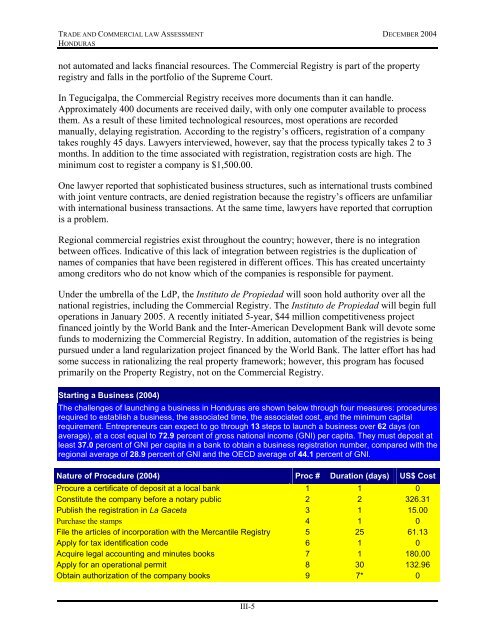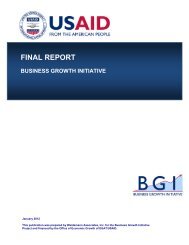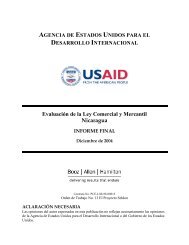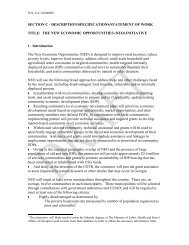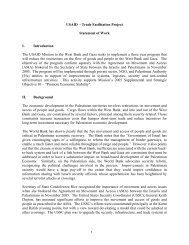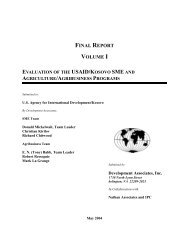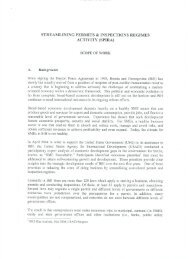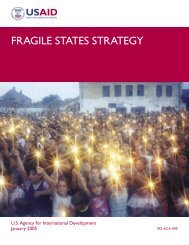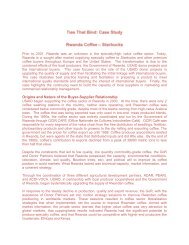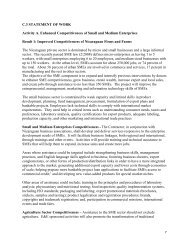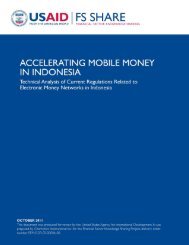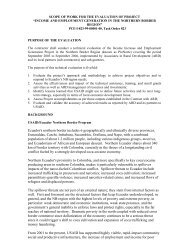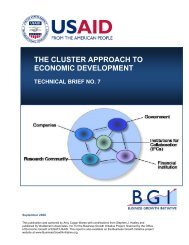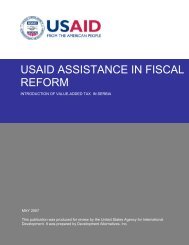Trade and Commercial Law Assessment - Honduras - Economic ...
Trade and Commercial Law Assessment - Honduras - Economic ...
Trade and Commercial Law Assessment - Honduras - Economic ...
You also want an ePaper? Increase the reach of your titles
YUMPU automatically turns print PDFs into web optimized ePapers that Google loves.
TRADE AND COMMERCIAL LAW ASSESSMENT DECEMBER 2004HONDURASnot automated <strong>and</strong> lacks financial resources. The <strong>Commercial</strong> Registry is part of the propertyregistry <strong>and</strong> falls in the portfolio of the Supreme Court.In Tegucigalpa, the <strong>Commercial</strong> Registry receives more documents than it can h<strong>and</strong>le.Approximately 400 documents are received daily, with only one computer available to processthem. As a result of these limited technological resources, most operations are recordedmanually, delaying registration. According to the registry’s officers, registration of a companytakes roughly 45 days. <strong>Law</strong>yers interviewed, however, say that the process typically takes 2 to 3months. In addition to the time associated with registration, registration costs are high. Theminimum cost to register a company is $1,500.00.One lawyer reported that sophisticated business structures, such as international trusts combinedwith joint venture contracts, are denied registration because the registry’s officers are unfamiliarwith international business transactions. At the same time, lawyers have reported that corruptionis a problem.Regional commercial registries exist throughout the country; however, there is no integrationbetween offices. Indicative of this lack of integration between registries is the duplication ofnames of companies that have been registered in different offices. This has created uncertaintyamong creditors who do not know which of the companies is responsible for payment.Under the umbrella of the LdP, the Instituto de Propiedad will soon hold authority over all thenational registries, including the <strong>Commercial</strong> Registry. The Instituto de Propiedad will begin fulloperations in January 2005. A recently initiated 5-year, $44 million competitiveness projectfinanced jointly by the World Bank <strong>and</strong> the Inter-American Development Bank will devote somefunds to modernizing the <strong>Commercial</strong> Registry. In addition, automation of the registries is beingpursued under a l<strong>and</strong> regularization project financed by the World Bank. The latter effort has hadsome success in rationalizing the real property framework; however, this program has focusedprimarily on the Property Registry, not on the <strong>Commercial</strong> Registry.Starting a Business (2004)The challenges of launching a business in <strong>Honduras</strong> are shown below through four measures: proceduresrequired to establish a business, the associated time, the associated cost, <strong>and</strong> the minimum capitalrequirement. Entrepreneurs can expect to go through 13 steps to launch a business over 62 days (onaverage), at a cost equal to 72.9 percent of gross national income (GNI) per capita. They must deposit atleast 37.0 percent of GNI per capita in a bank to obtain a business registration number, compared with theregional average of 28.9 percent of GNI <strong>and</strong> the OECD average of 44.1 percent of GNI.Nature of Procedure (2004) Proc # Duration (days) US$ CostProcure a certificate of deposit at a local bank 1 1 0Constitute the company before a notary public 2 2 326.31Publish the registration in La Gaceta 3 1 15.00Purchase the stamps 4 1 0File the articles of incorporation with the Mercantile Registry 5 25 61.13Apply for tax identification code 6 1 0Acquire legal accounting <strong>and</strong> minutes books 7 1 180.00Apply for an operational permit 8 30 132.96Obtain authorization of the company books 9 7* 0III-5


